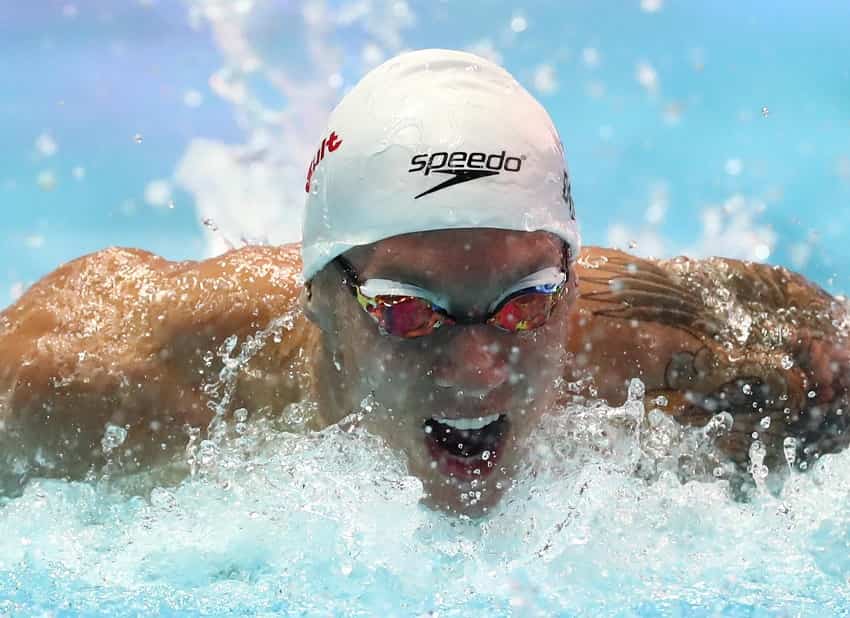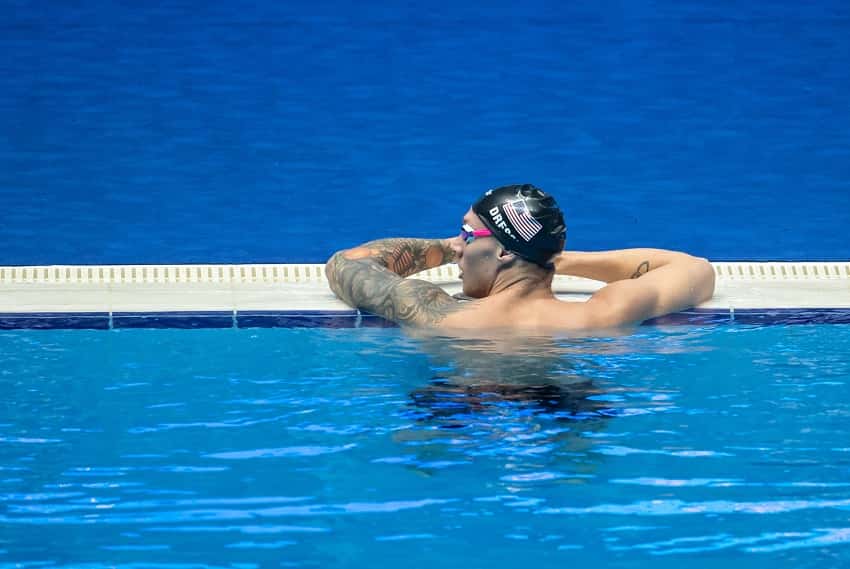Every swimmer experiences the highs and lows during training. Here’s how one of the best swimmers on the planet bounces back after a disappointing practice.
When you are doing everything right with your swimming, from eating good to helping take out the lane ropes after practice, it can be a bit frustrating when you have a bad practice.
The focus was there. You felt pretty good in the water. But the times were off.
From a mildly disappointing set to the practice that completely shatters your confidence, there are lots of reasons why a practice might go south on you: bad night of sleep, not recovered from yesterday’s workout, stress from school, or your stroke simply feels sloppy and weird.
These practices are bound to happen. Just as some workouts are exceptionally awesome, some are going to be exceptionally stinky.
The real issue with a bad practice is when you make things worse:
You completely abandon the workout—I don’t feel good in the water, and I’m not swimming fast, so I am not going to focus at all. The frustration that comes during a practice means we end up withdrawing and abandoning the workout. We go half-speed on the main set. Daydream instead of focusing on our technique. We figure since the practice feels lost, we might as well sandbag the whole thing.
Today’s practice was bad, so tomorrow’s workout is gonna suck too. Having the occasional bad practice won’t ruin your season. But having that workout spill into the next, and the next, and then the next, turning into a whole mini-series of bad practices, well, that will put some big holes in your season.
Although bad practices are a normal sign that you are a normal swimmer just trying to be better, there are some things you can do to make the most of the situation.
Caeleb Dressel, sprint superstar, is one of the fastest swimmers on the planet. And like you, he isn’t exempt from a frustrating practice or set.
Here are two things he does when things aren’t going his way at practice.
Get technical and focus on the simple things.
There are times where our sport feels positively mystifying.
We show up to the pool, warm-up normally, do the pre-set, and then once the main set starts… Nothing. Our speed isn’t there. Our stroke rate is through the roof. The harder we try, the sloppier our stroke gets, the slower we go, and the more frustrated we become.
In moments like these, instead of throwing futile waves of effort at your speed, go back to the fundamentals. Streamline tightly. Speed up when you head into the walls. Hit that high elbow catch. Dolphin kick with equal force in both directions. Brace your core and focus on swimming “downhill.”
When Dressel is having a struggle in practice, he focuses on nailing a couple really simple technical things.
“If I’m doing super bad that day,” says Dressel in one of USA Swimming’s recent vlogs. “I can at any point do five kicks off every wall [when swimming] freestyle… and then work on the breakout.”
But that’s not all.
“And how hard can it be to focus on the correct catch, not slipping my arm to the outside,” he adds. “Just two things.”
The lesson here is simple: You can still make the most of your time in the water by focusing on the basics. The side effect of doing this? By swimming really well, you are more likely to start swimming fast again.
Avoid the urge to dwell on a bad workout.
On the one hand, bad workouts can give us a jolt of fury to come back with a better effort tomorrow. Redirecting today’s frustration towards tomorrow’s increased effort is great.
But there’s a fine line between using anger for good and mentally beating yourself up.
When a workout goes poorly, you might start thinking about how it relates to your season end goal. Have you gotten further away from getting faster? Is the competition gonna trounce you now because of that bad session? Because you missed an interval that you usually make, does this mean you’ve somehow become a slower swimmer?
Today’s bad workout isn’t going to go away because you mentally lash yourself and start focusing on the uncertainties that the future presents. Dwelling and obsessing won’t fix today’s bad effort, and it won’t help you de-stress and unplug while you are away from the pool.
That’s why it’s key you are able to let go of bad workouts.
“If I have a bad practice, it’s hard for me to unwind from that,” says Dressel. “I don’t like having bad practices, it makes me anxious…. I will lose some sleep at night.”
To help fight the natural urge to dwell and stress over a bad session, Dressel “flushes” his bad sessions by writing them out in the pages of his logbook. He has been writing out his practices in a series of logbooks since his age group swimming days, jotting down “anything and everything” including the sets, dryland, weight sessions, his technique.
“Once I put pen to paper… it almost helps me get rid of it, whether it’s good or bad.”
A bonus tip for you swimmers who log your workouts.
When reflecting in the pages of your training journal, try to avoid the judgements that are bubbling up when you have a bad session (I suck at this, I can’t believe I swam so slow, I’ll never accomplish my goals).
Instead, look at what you can do better tomorrow in your preparation and technique (Didn’t warm up properly, Focus on my performance cues, Streamline better next time, Eat a healthier meal before practice).
Evaluating your swimming this way will give you some controllable things to use to turn things around. Momentum is easier to build when we direct our attention to things that we control and help us perform better.
The next step
The occasional bad set or practice doesn’t mean there is something wrong with you.
Even the world’s fastest swimmer isn’t immune to the occasional duffer when he puts on his swim goggles and heads to the pool. Michael Phelps had plenty of bad workouts. Katie Ledecky has ‘em too.
So the next time things aren’t going your way, and you are fish-tailing across the pool, instead of giving up or getting overly down on yourself, focus on doing a couple technical things really well.
You won’t save every bad workout, but you will save enough of them, and that will be more than enough to make a difference at the end of the season.
More Stuff Like This:
7 Reasons Caeleb Dressel’s Start is the Best in the World. Caeleb Dressel’s start has become a thing of legend. Here are some things you can learn from the fastest swimmer on the planet.
Caeleb Dressel: Carry a Big Kick and Bigger Goals. At the NCAA championships Dressel made history becoming the first man to break 18 seconds in the 50 yard freestyle.















